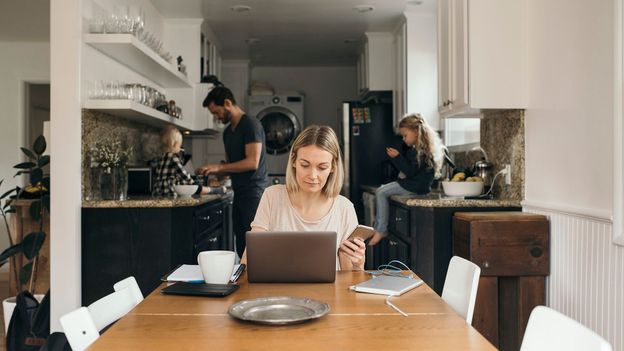Lynda Grattan, a professor at London Business School who specialises in the future of work, flags up other points; Bloom’s experiment was easy to carry out because it was essentially happening at a call centre. “We have no proper data on the productivity of knowledge workers when they’re based at home,” she says. (In other words, workers whose day-to-day isn’t as repetitive with countable tasks.) However, she says that in her experience with executives during the pandemic, most have said their knowledge workers have become more productive.
Grattan also highlights the inequality that becomes visible with remote work. It’s harder to be productive when you’re in a less-than-ideal living situation, like a cramped flat with no home office. Remember, those in Bloom’s study had a room to work in that wasn’t their bedroom. For many people, that is simply not the case.
Feeling disconnected
There’s also the question of the effects of physically seeing colleagues. It’s an important consideration, because if large-scale working from home becomes a reality, you may never see your colleagues in person again. Your day to day could just be Zoom calls – or even virtual on-screen avatars that replace your face, says Grattan.
But it’s important to have those face-to-face interactions, says Grattan. She doesn’t think all offices in the world could do what Ctrip did. She says that in many offices “serendipity is important: bumping into people, they’re seeing people in the corridor. Quite a lot of the ways that we make decisions in organisations aren’t made in meetings. They’re made in the corridors”.
Eddie Obeng, founder of Pentacle, a virtual business school, say he’s concerned about remote workers’ feelings of isolation and loneliness, in the absence of those important personal interactions. It’s a point reinforced by Christy Johnson, who runs a US-based consulting company staffed entirely by remote workers. She says that isolation was the biggest source of staff turnover during her first year. She tries to organise annual in-person meetings to compensate for this loss of in-person interaction that could potentially weaken morale or slow productivity. She also tries to replicate ad-hoc conversations on Friday afternoons about people’s fun plans for the weekend, in the way people would speak on a Friday afternoon in a real office.
Even Bloom says that that one day a week in the office is vital for team cohesion and human interaction.
Still, he thinks that the gains we could get from widespread WFH – pandemic or not – are important, and the pros outweigh the cons. “In the long run, I think it’s huge. Imagine: we go to something like, 20% of our days are spent working from home. That’s 20% less commuting. That’s the ability to live further out of city centres to reorganise our lives [and] have some quiet tranquillity. So yes, I think it’s an enormous benefit,” he says. “If we get it right.”













